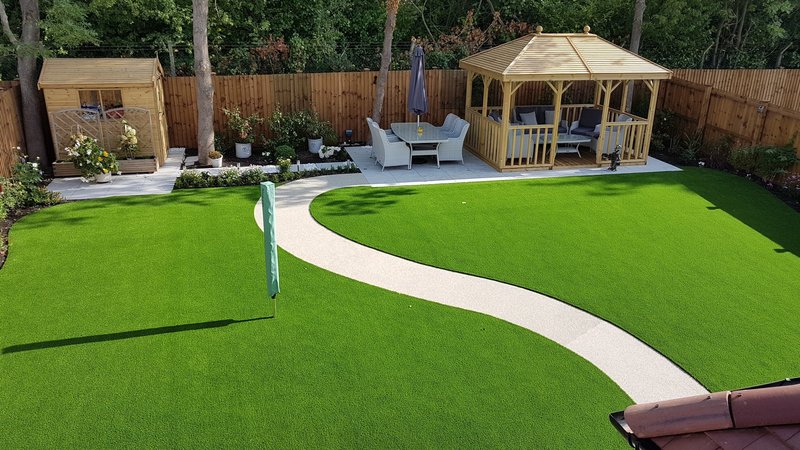Benefits of Artificial Turf
Artificial turf, also known as synthetic grass, has gained immense popularity in recent years. This innovative alternative to natural grass offers numerous benefits that make it an attractive choice for homeowners, businesses, and sports facilities alike. In this article, we will explore the various advantages of artificial turf and why it has become a preferred option for many.
Enhanced Durability
One of the key benefits of artificial turf is its exceptional durability. Unlike natural grass which can get damaged easily, artificial turf is designed to withstand heavy foot traffic, extreme weather conditions, and intense sporting activities. It retains its lush green appearance throughout the year, providing a visually appealing landscape without the need for constant maintenance.
Low Maintenance
Artificial turf requires minimal upkeep compared to natural grass. Say goodbye to mowing, watering, fertilizing, and weeding. With artificial turf, you can save both time and money on maintenance tasks. Additionally, it eliminates the need for harmful pesticides and herbicides, making it an environmentally friendly choice.
Water Conservation
In regions facing water scarcity, artificial turf plays a crucial role in water conservation efforts. Unlike natural grass, which demands significant amounts of water to stay healthy and vibrant, artificial turf does not require regular watering. This not only helps conserve water but also reduces your water bills, making it an economically sound choice in the long run.
All-Weather Playability
One of the standout advantages of artificial turf is its ability to withstand all weather conditions. Whether it’s scorching heat, heavy rain, or freezing temperatures, artificial turf maintains its integrity and usability. This makes it an ideal option for sports fields, playgrounds, and outdoor recreational areas, ensuring consistent playability throughout the year.
Improved Safety
Artificial turf offers enhanced safety features, making it an excellent choice for families with children and sports enthusiasts. It provides a level and cushioned surface that minimizes the risk of injuries caused by falls or impacts. Additionally, artificial turf eliminates the presence of allergens, such as pollen, making it a healthier option for individuals with allergies or respiratory conditions.
Cost-Effectiveness
While the initial investment in artificial turf may be higher than natural grass, it proves to be a cost-effective choice in the long term. With artificial turf, you can save on expenses associated with watering, mowing equipment, fertilizers, and professional lawn care services. Moreover, its durability ensures that it maintains its quality and appearance for many years, reducing the need for frequent replacements.
Environmental Benefits
Artificial turf offers several environmental benefits that contribute to a sustainable future. By eliminating the need for watering and chemical treatments, it reduces water consumption and minimizes the release of harmful pollutants into the environment. Additionally, artificial turf does not require gasoline-powered lawnmowers, reducing carbon emissions and noise pollution.

Artificial turf provides a plethora of benefits that make it an excellent choice for various applications. Its durability, low maintenance requirements, water conservation properties, all-weather playability, improved safety features, cost-effectiveness, and environmental advantages contribute to its rising popularity. Consider opting for artificial turf to enjoy a beautiful, hassle-free, and sustainable landscape for years to come.
Frequently Asked Questions about the Benefits of Artificial Turf
1. What are the main advantages of using artificial turf?
Artificial turf offers several benefits, including low maintenance, durability, water conservation, and a consistently green appearance.
2. Does artificial turf require watering?
No, one of the advantages of artificial turf is that it does not require regular watering like natural grass. This helps to conserve water resources.
3. Is artificial turf safe for children and pets?
Yes, artificial turf is designed to be safe for children and pets. It is made using non-toxic materials and is free from harmful chemicals.
4. Can artificial turf withstand heavy foot traffic?
Absolutely! Artificial turf is designed to withstand heavy foot traffic and maintain its appearance. It is commonly used in high-traffic areas such as sports fields and playgrounds.
5. Does artificial turf fade in the sun?
No, artificial turf is specifically manufactured to resist fading caused by sunlight. It will maintain its vibrant green color even with prolonged exposure to the sun.
6. How long does artificial turf last?
With proper care and maintenance, artificial turf can last up to 20 years or more. This makes it a long-term investment for homeowners and businesses.
7. Does artificial turf require mowing?
No, one of the advantages of artificial turf is that it does not require mowing. You can say goodbye to the hassle of regular lawn mowing!
8. Can artificial turf help reduce allergies?
Yes, artificial turf can be beneficial for individuals with grass allergies. Since it does not produce pollen, it can help reduce allergic reactions commonly associated with natural grass.
9. Is artificial turf environmentally friendly?
Yes, artificial turf is considered environmentally friendly. It eliminates the need for harmful pesticides, fertilizers, and excessive water usage, contributing to a greener and more sustainable environment.
10. Can artificial turf be installed in any climate?
Artificial turf can be installed in various climates, including hot and cold regions. It is designed to withstand extreme weather conditions and maintain its quality and appearance.




